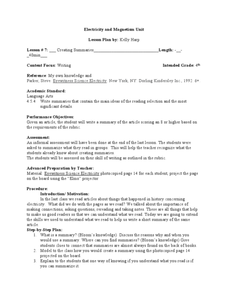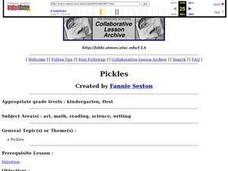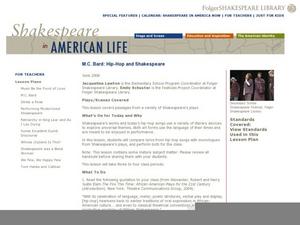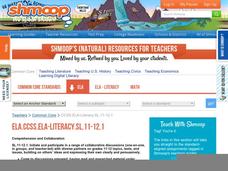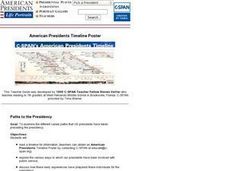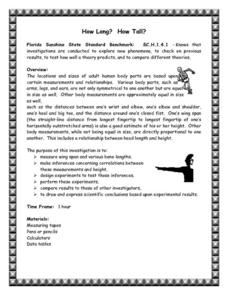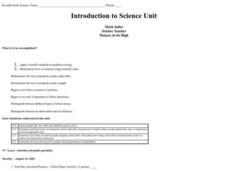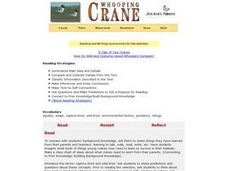Curated OER
Creating Summaries
Fourth graders generate written summaries from non-fiction articles. In this writing lesson, 4th graders determine what must be included in writing a good summary and then work in small groups to construct summaries after reading...
Curated OER
A Photosynthesis Timeline
Science learners discover that scientific advancements come in increments. Beginning as an idea, changes and developments are influenced by available resources and current societal values. As an example, pupils examine the conclusions...
Curated OER
Make a Solar Sill
Students design a solar still and purify water. In this earth process and design lesson, students observe how the heat of the sun helps to purify water. Students analyze why this could be helpful on a desert island. Students record...
Curated OER
Learning the Roles in Literature Circles
I love literature circles! Get your pupils together and have them discuss the book they are reading. They determine and practice their role in the literature circle then discuss the book they are reading. This is a great introduction to...
Curated OER
Rock My World
Students conduct a hands-on experiment designed to demonstrate how continents and oceans formed and why the manner of formation is relevant to a study of volcanoes.
Foreign Policy Research Institute
Exploring Korea
A thorough and fun lesson on Korea! In groups of four (Social Chair, Historian, Translator, Travel Agent) class members research North and South Korea to determine a good location for an overseas institute for studying abroad. Once this...
Curated OER
Pickles
Young learners compare healthy foods to junk foods. They examine the growing process of a vegetable from a seed all the way to maturity. The book, The Magic School Bus in a Pickle is used. Some nice cross-curricular activities in math,...
Curated OER
Waves
Light waves and sound waves are the focus of this science lesson designed for 5th graders. Besides discovering how these waves travel, learners also discover the basic properties of waves, and analyze data tables and graphs. The...
Curated OER
M.C. Bard: Hip-Hop and Shakespeare
What is poetry? Does hip-hop qualify as poetry? Do Shakespeare's monologues qualify as poetry? Class members grapple with these questions as they examine the poetic elements and themes presented in different texts. Groups of four study...
Shmoop
ELA.CCSS.ELA-Literacy.SL.11-12.1
You want your class to meet all of the Common Core standards, and here is one way to tackle the first speaking and listening standard. Given a theme to focus on from "How Much Land Does a Man Need?" by Leo Tolstoy, small groups come up...
Curated OER
How Do We Learn About the Past?
Sixth graders discuss the role of an archaeologist as a class. After viewing photographs, they relate the objects found in their local area and Ancient Egypt. They draw a picture of an object that represents their own culture and gives...
Curated OER
How Can You Study Things You Can’t See Like: Atoms?
Learners simulate how scientists studied things they can't see like atoms. In this chemistry lesson, students predict what is inside the numbered obsertainers. They design a way to investigate what's inside without opening it.
Curated OER
Mississippi’s Contribution to Space Exploration
Eighth graders engage in a class discussion while going through a PowerPoint on Mississippi's contribution to space exploration. In this Space science lesson plan, the students will also participate in Brain Pop quizzes where they will...
Curated OER
Paths to the Presidency
Seventh graders investigate a timeline of the career paths that US presidents took before they became the president. They how these career choices prepared these men for the presidency.
Curated OER
How Long? How Tall?
Seventh graders investigate the parts of the human body and examine the symmetry of body parts like arms and legs. They measure the body parts and take individual height and weight to compare the quantities. Student examine whether the...
Curated OER
Introduction to Science
Seventh graders investigate scientific methods to solve problems. They demonstrate creating data tables and graphs. They study the role of a scientist and the importance of safety in a science lab. They distinguish between an...
Curated OER
Using My Nasa Data To Determine Volcanic Activity
Students use NASA satellite data of optical depth as a tool to determine volcanic activity on Reunion Island during 2000-2001. They access the data and utilize Excel to create a graph that has optical depth as a function of time for the...
Curated OER
Mississippi’s Electricity: From Generation to Consumption
Eighth graders discover how electricity is produced. In this physics lesson, 8th graders infer about the future of Mississippi's energy industry. They participate in a Smart Board interactive activity at the end of the lesson.
Curated OER
How Low Can You Go?
Students are introduced to the concepts of elevation and slopes. Using Minneapolis and St. Paul, they graph elevation of various cities in a scenerio given to them. They also calculate the total miles traveled and organize the...
Curated OER
A Tale of Two Cranes How Do Wild and Costume-raised Whoopers Compare?
Students explore what young cranes need to do to survive.
Curated OER
A Journey To Africa: Art And Artifacts
Students create a multimedia presentation based on a piece of African Art. They use the art piece to demonstrate the culture and ceremonies of the area in which it was produced. They research facts for a Power Point, write a poem...
Curated OER
Using Scholastic News to Introduce the Net
Third graders log on to the net, type in the address for Scholastic and browse the subjects for the week. They select one area of interest and generate five interesting facts about the article.
Curated OER
Down To Earth
Fifth graders study the physical properties of minerals in order to identify them. They examine how minerals are used before taking part in a activity in which they market toothpaste made from specific minerals.
Curated OER
Relating Number of Insect Species to Water Quality
Students are asked to respond to questions such as:" Have there been surveys of the area to inventory the species?" (For example, for a wetland area, do they know what amphibians live there and how abundant they are?) Are there any...


